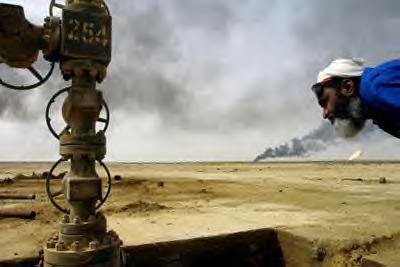
(Aisa Bou Yabes, head of the Kuwait Oil Company firefighting team dispatched to southern Iraq, inspects damage to oil well heads in Iraq's Rumeilah Oil Field. The wells were set ablaze with explosives by retreating Iraqi troops when the US and UK invasion began. Seven or eight wells were set ablaze. Rumeilah is one of Iraq's biggest oil fields with five billion barrels in reserve. Many of the wells are 10,000 feet deep and produce huge volumes of oil and gas under tremendous pressure, which makes capping them difficult and dangerous.)
Tomgram:
Michael Klare on Iraq's Missing Sea of Oil
The strangest aspect of media coverage of our invasion and occupation of Iraq involved that country's oil. Everyone, including the Bush administration, was well aware that Iraq sat on a sea of it. It was obvious that Middle Eastern oil was a global lifeline and an ever more valuable commodity; and yet, unless you were a faithful reader of the business pages, for days, weeks, even months on end, it was impossible to find serious discussion of Iraqi oil in the mainstream media. Forget the fact that a number of the major players in the Bush administration came out of the energy business; that Condoleezza Rice, the national security advisor, had had an oil tanker named after her (when she was still on Chevron's board of directors); that the neocons and their supporters evinced a special interest in the oil heartlands of our planet (a.k.a. "the arc of instability"); or that the Pentagon was staking those heartlands out, base by base.(to read more)
Nonetheless, when it came to the punditocracy just about the only discussion of Iraqi oil was restricted to the dismissal of claims by the antiwar movement that oil was either the (or a) significant factor in the invasion, a position supposedly too simpleminded to be taken seriously. As I've written before, if Iraq's main export had been video games, the press would have been flooded with pieces of every sort about our children's entertainment future; and yet, until the Iraqi resistance began blowing up pipelines, reports on Iraqi oil were as few and far between as oases in a desert. Even today, with pump prices through the ceiling and global energy supplies tight, Iraqi oil -- or the lack of it -- is not exactly headline material. As Jonathan Schell said to me recently, speaking of media attitudes, "If the Bush administration is not supposed to be interested in oil in Iraq, why are they so interested in it in Alaska?"
(Photo: Peter Menzel, Photography)
No comments:
Post a Comment